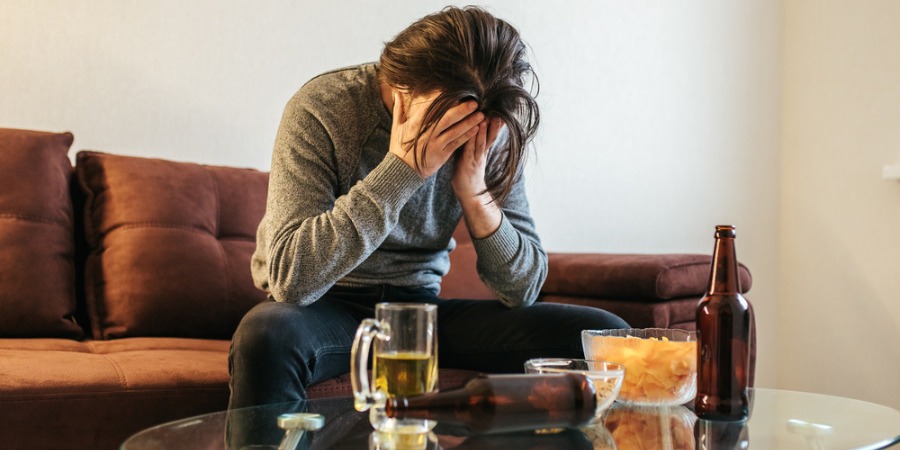Alcohol withdrawal can be a daunting experience for those who have developed a dependence on alcohol.
The symptoms can range from mild discomfort to severe complications, making the process of quitting especially challenging.
Understanding how to effectively manage and ultimately stop alcohol withdrawal symptoms is crucial for anyone looking to regain control of their life.
This article delves into practical strategies to alleviate withdrawal symptoms and highlights the importance of seeking professional help.
Understanding Alcohol Withdrawal

Source: ukat.co.uk
When a person who has been drinking heavily for an extended period suddenly reduces or stops alcohol consumption, they may experience withdrawal symptoms.
These symptoms occur because the body has become accustomed to the presence of alcohol, and its sudden absence disrupts normal functioning.
According to the National Health Service (NHS), around 1 in 3 people who are dependent on alcohol will experience withdrawal symptoms when they stop drinking.
Common withdrawal symptoms include anxiety, tremors, sweating, nausea, and in severe cases, seizures or delirium tremens (DTs).
Understanding these symptoms is the first step in effectively managing them.
Preparing for Withdrawal
Before attempting to stop drinking, it is essential to prepare both mentally and physically. Here are some steps to consider:
1. Consult a Healthcare Professional
One of the most critical steps in managing alcohol withdrawal is seeking professional help. A healthcare provider can assess the severity of your alcohol dependence and recommend an appropriate course of action.
They may suggest a medically supervised detox programme, which can significantly reduce the risk of severe withdrawal symptoms and complications.
2. Create a Support System
Having a strong support system is vital during this challenging time. Reach out to friends, family, or support groups who understand what you are going through.
Sharing your experiences and feelings can alleviate the emotional burden of withdrawal.
Support groups, such as Alcoholics Anonymous (AA), provide a community of individuals who have faced similar challenges and can offer valuable insights.
Managing Withdrawal Symptoms

Source: tampa-recovery.com
Once you have prepared to stop drinking, there are several strategies to help manage withdrawal symptoms effectively:
1. Stay Hydrated
Dehydration can exacerbate withdrawal symptoms such as headaches and nausea. Drinking plenty of water and electrolyte-rich fluids can help your body cope with the changes it is undergoing.
Herbal teas and clear broths can also provide comfort and hydration.
2. Eat a Balanced Diet
A nutritious diet can play a significant role in alleviating withdrawal symptoms. Focus on consuming whole foods, including fruits, vegetables, lean proteins, and whole grains.
Foods rich in vitamins and minerals, particularly B vitamins and magnesium, can help support your nervous system and reduce anxiety.
3. Practice Relaxation Techniques
Managing stress and anxiety is crucial when dealing with alcohol withdrawal. Incorporating relaxation techniques such as deep breathing exercises, meditation, or yoga can help calm your mind and body. These practices can promote a sense of well-being and provide tools to cope with cravings and withdrawal symptoms.
4. Engage in Physical Activity
Regular physical activity can be beneficial during withdrawal. Exercise releases endorphins, which can improve mood and reduce feelings of anxiety. Aim for moderate activities such as walking, jogging, or cycling. Finding an activity you enjoy can make it easier to stick with a routine.
5. Establish a Routine
Creating a daily routine can provide structure and stability during withdrawal. Having a set schedule for meals, exercise, and relaxation can help reduce feelings of chaos and anxiety.
Incorporating activities that promote mental engagement, such as reading or hobbies, can also distract from cravings.
Seeking Professional Help for Severe Symptoms

Source: discoverynj.org
For some individuals, withdrawal symptoms can become severe and may require medical intervention. In cases of significant dependence, healthcare providers may prescribe medications to help alleviate symptoms and reduce the risk of complications.
Medications such as benzodiazepines can be used to manage anxiety and prevent seizures during the withdrawal process.
In addition to medication, participating in a structured detox programme at a rehabilitation centre can provide the necessary support and resources for a successful recovery.
These facilities offer medical supervision, counselling, and a supportive environment to help individuals navigate the challenges of withdrawal.
Navigating the “Second Wave”: PAWS and Mental Resilience
While the initial, acute phase of withdrawal is often the most physically intense, many individuals encounter a lesser-known stage called Post-Acute Withdrawal Syndrome (PAWS).
This phase can emerge weeks or even months after the last drink, manifesting as irritability, sleep disturbances, fatigue, and sudden mood swings.
It is vital to recognise that these symptoms are not signs of failure, but rather evidence that the brain is slowly recalibrating its chemistry after prolonged exposure to alcohol.
Understanding this timeline is a powerful tool; knowing that this emotional rollercoaster is temporary—and a normal part of the healing process—helps individuals stay the course when they feel “off” without an obvious reason.
Furthermore, stopping the symptoms “once and for all” requires addressing the psychological triggers that fuel the addiction loop.
This involves more than just willpower; it requires specific cognitive tools.
One effective method is learning to identify personal triggers, often summarized by the acronym HALT (Hungry, Angry, Lonely, Tired).
Cravings often masquerade as a need for alcohol when they are actually a response to these physical or emotional states.
By addressing the root cause—eating a meal, venting frustration, calling a friend, or resting—you can diffuse the intensity of a craving before it becomes overwhelming.
Mastering these mental strategies ensures that the cycle of physical withdrawal does not begin again.
Long-Term Strategies for Recovery
Once the immediate withdrawal symptoms have subsided, it is essential to focus on long-term strategies for maintaining sobriety.
Continued participation in support groups, therapy, and lifestyle changes can help prevent relapse and promote a healthier lifestyle.
Establishing new, healthy habits can replace the role that alcohol once played in your life.
Engaging in social activities that do not revolve around drinking, pursuing hobbies, and building a supportive network can significantly contribute to long-term recovery.
Stopping alcohol withdrawal symptoms is a challenging but achievable goal.
By understanding the nature of withdrawal and implementing effective strategies, individuals can navigate this difficult process.
Seeking professional help, staying hydrated, eating well, and engaging in relaxation techniques are all vital steps in managing withdrawal symptoms.
Ultimately, the journey to recovery requires commitment, support, and a willingness to embrace change. With the right approach, it is possible to overcome alcohol dependence and lead a healthier, more fulfilling life.












